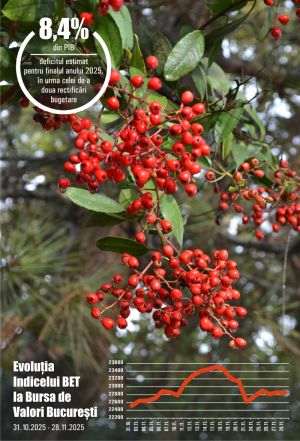Global stock markets were gripped by panic in the first trading session this week as the latest economic data from the United States reignited investor fears of a possible US recession, results from several big names in technology the growth prospects of companies are in doubt, and in Japan the increase in interest rates by the central bank seems to massively affect the markets, according to the international press.
In the United States, after the first hour of trading, the S&P index was down about 3%, while for the Dow Jones, the decline was 2.4%. The Nasdaq Composite, of companies operating in knowledge-intensive fields, had a 3.6% decline. Compared to the July record, the technology index was down 13%, thus being in "correction" territory, generically defined as a decline of more than 10% from a recent high.
The VIX index, a measure of the expected volatility of the US stock market, rose to a high of 65 yesterday, the highest level reached by the "Fear Index" since April 2020.
• Buffett has halved Berkshire Hathaway's stake in Apple
Berkshire Hathaway, Warren Buffett's investment company, halved its stake in Apple, sold $3.8 billion of Bank of America shares, as Berkshire's cash hoard rose to $277 billion, according to information published in the international press over the weekend. The moves suggest Buffett, one of the world's most respected and watched investors, is growing wary of the U.S. economy or stock valuations that have become too high, according to Reuters.
In Europe, at 17:30, the Stoxx 600 index had a 2.4% decline, with all stock exchanges and all sectors being in the red. In Frankfurt, the DAX index was down 2.3%, while in Paris, the CAC40 index was down 1.9%. In London, the FTSE 100 index depreciated by 2.3%.
In Japan, Tokyo's Nikkei stock index plunged 12.4%, the biggest drop since Black Monday in 1987, erasing all of this year's gains. In South Korea, the Kospi index depreciated by 8.77% on Monday, while in China the depreciations were smaller.
According to the international media, another reason that contributed to the decline of the global stock markets is related to the interest rate increase by the National Bank of Japan last week. Thus, the yen appreciates against the US dollar, affecting the so-called "carry trade", whereby investors borrow in a currency with low interest rates to place the money in other assets with higher yields.
Yesterday's declines come after sharp declines late last week, boosted by U.S. labor market data and below-expected results from companies such as Amazon and Intel with weak growth forecasts, which sparked a wave of selling that brought the Nasdaq Composite index to the threshold of "correction".
"I think a lot of things happened over the weekend that are being absorbed; Berkshire selling Apple, the sell-off in Japan, the top of the yen and the end of that carry trade ... we have a lot of bad news priced in," Victoria Greene, chief investment officer at G Squared Private Wealth, told CNBC. "It is a withdrawal, a correction. We'll probably get oversold pretty quickly at these levels."
• The US labor market is cooling faster than economists expected
Data released late last week showed that the US economy added 114,000 jobs in July, less than the 175,000 expected. The unemployment rate also rose to 4.3 percent from the consensus of 4.1 percent, while wage growth was 3.6 percent, the weakest increase in more than three years, according to Bloomberg.
The wave of selling earlier this month appears to mark a change in how investors interpret weak economic data. If a few months ago signs of a slowing economy fueled interest rate cut expectations, now that markets are confident the Federal Reserve will make its first rate cut in September, investors are beginning to worry that the economy is slowing too fast.
"Bad news (for the economy) is no longer good news for stocks," said John Lynch, chief investment officer at Comerica Wealth Management, who added that this would increase pressure on the Fed's monetary policy, according to Business Insider.
• Traders are betting heavily on a 50 basis point rate cut by the Fed in September, according to CME FedWatch Tool
Economics professor Jeremy Siegel is calling for the Federal Reserve to cut the federal funds rate by 75 basis points. Wisdom Tree's chief economist also pointed out that there should be another 75-basis rate cut at the Fed's September meeting, according to CNBC.
"This is the minimum," said the economist. "The federal funds rate should be somewhere between 3.5 and 4% right now."
Meanwhile, futures traders were predicting a 100% chance the Federal Reserve would cut interest rates in September yesterday, with a 91% chance the bank would cut rates by 50 basis points, according to the CME FedWatch Tool.
Some analysts and investors wonder if the Fed has kept interest rates high for too long, so high borrowing costs are already hitting the U.S. economy too hard. "The slowdown in the labor market is now materializing more clearly.
Did the Fed make a policy mistake?" says Seema Shah, chief global strategist at Principal Asset Management, adding that new jobs created in the United States fell below levels typical of a "solid economy," writes Business Insider.
In addition, reports from big tech names have cast doubt on the real monetization potential of companies' huge investments in artificial intelligence (AI) infrastructure. "Right now, there's a debate in the industry about the capital expenditure requirements for generative AI and whether monetization will rise to those levels," Keith Weiss, an analyst at Morgan Stanley, said late last week on the conference call presentation of Microsoft's results, according to CNN Business.
• Tom Lee, Fundstrat: "Cutting interest rates will mark an inflection point in the market as such a move creates expectations of reduced borrowing costs in several sectors"
Tom Lee, head of research at Fundstrat Global Advisors and one of Wall Street's most bullish analysts, believes the sell-off late last week was likely fueled by heightened factors such as uncertainty surrounding the presidential election, geopolitical tensions and concerns related to a possible recession.
But unlike investors who have already panicked, Lee saw several reasons why the market is likely experiencing just one pullback, according to Business Insider. "After last week's monetary policy meeting, central bank officials are expected to provide more information on interest rate cuts in the coming weeks," Lee said, adding that a clear signal from the Fed on rate cuts could change the direction of markets. towards a "more positive trajectory".
Meanwhile, the next inflation data will be released on August 11, and the continuation of the disinflationary trend may also boost investor confidence about a rate cut, which may boost share prices.
"This would probably alleviate concerns that the Fed is wrong," the analyst added. In Lee's view, the interest rate cut will mark an inflection point in the market as such a move creates expectations of lower borrowing costs in several sectors. "Certain types of debt, such as adjustable-rate mortgages and car loans, are financed by short-term interest loans, which means that for those sectors, the impact of the rate cut will be positive," added Fundstrat's head of research.
• Angelo Kourkafas: "Historically, the three-month period between August and October was the weakest for equities, with lower returns and higher volatility"
Angelo Kourkafas, CFA, investment strategist at Edward Jones Investments, expects volatility to rise but the long-term bull market that began nearly two years ago to continue.
"Concerns that interest rate cuts by the Federal Reserve may come too late, coupled with election uncertainty, may bring more volatility to the market, especially as we enter a lean season for stocks. Historically, the three-month period between August and October has been the weakest for equities, with lower returns and higher volatility. However, this negative seasonality was more pronounced when the market was in a downtrend, rather than in a strong uptrend like this year," Kourkafas wrote in his latest analysis, published late last week.
According to the strategist, who cites Bloomberg data, since 1941, every time the S&P 500 has risen at least 10% in the first six months of a year, it has appreciated an average of 7% in the second half. Also, the market had positive returns almost 80% of the time in the second half of the year, compared to 66% for any other period. However, the withdrawals tend to be more severe than in the first part of the year, with an average of 9%.

"We believe artificial intelligence will grow rapidly over the next five to ten years and can continue to generate revenue for companies that are spending heavily today to develop it. However, there will likely be a time lag between when the costs occur and when companies can reap the benefits of their investments," said Kourkafas.
• "While we see an inflection point in volatility, we don't expect the short-term pullback to change the relatively positive outlook," says Edward Jones Investments strategist
Beyond technology, the outlook for corporate earnings remains positive, with S&P 500 corporate earnings growth poised to accelerate from 6% in the first quarter to around 11% in the second. The biggest positive surprises come from cyclical and defensive sectors such as financials and healthcare, and less so from growth sectors, according to strategist Edward Jones Investments.
"From a fundamental perspective, while we see a possible inflection point in volatility, we do not expect short-term pullbacks to change the relatively positive outlook. Inflation is approaching the target, thus providing room for the Fed to take its foot off the brake (n.r. in the sense of cutting interest rates); the economy continues to expand, just at a slower pace; productivity is increasing; corporate profits are rising. Therefore, we do not believe that the bull market that began in October 2022 is over, and we would use any pullback, such as last week, as an opportunity to rebalance, diversify and place fresh capital," the CFA analyst wrote .
• Hedge funds reduced their exposure to seven out of eleven global sectors, according to Goldman Sachs
Global hedge funds, on the other hand, increased their bearish bets on stocks in the first four days of last week, marking the third week in a row that funds' new bearish positions outnumbered their bearish ones. they bet on growth, according to Goldman Sachs, writes Reuters.
According to the mentioned source, for every new long position (n.r. in which they bet on growth) the funds opened 3.3 new short positions (n.r. in which they bet on decrease). Reuters also notes that, according to Goldman, hedge funds reduced their exposure to seven out of eleven global sectors, including financials, industrials, real estate and energy. Health care stocks also saw their fastest pace of selling in the past year.
Despite the decline in recent days, the main indices in the United States are up since the beginning of the year.




























































